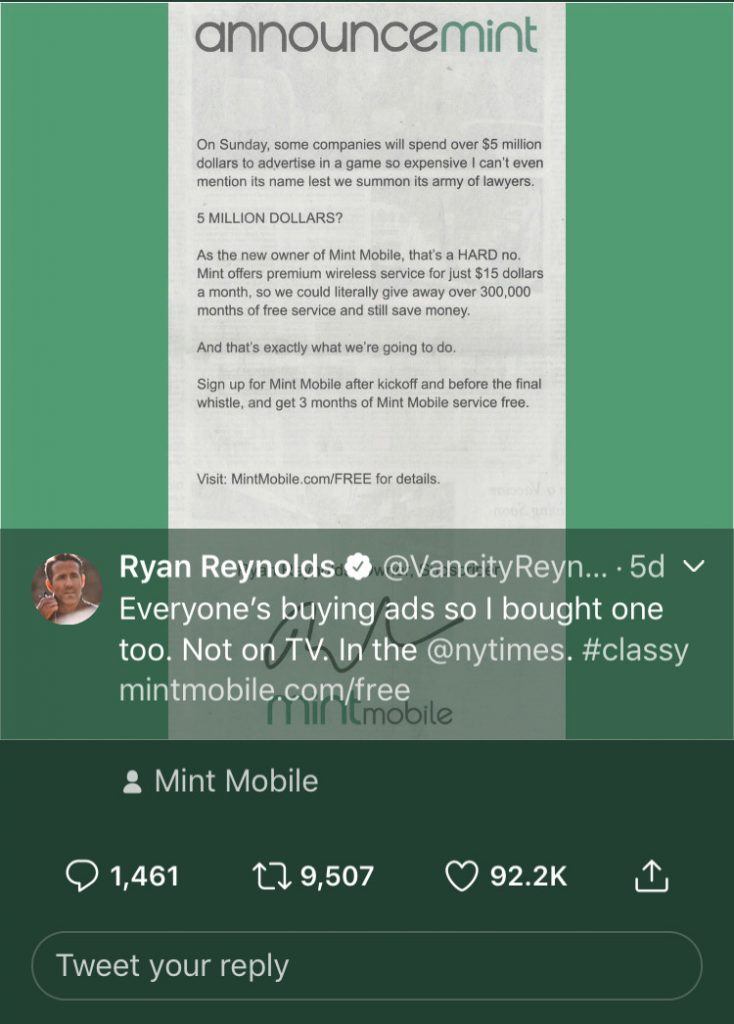
Did you hear about Ryan Reynold’s newest acquisition, Mint Mobile, spending $5 mm to buy a 30 second spot during the Superbowl? No? That’s because they bought an ad in the NY Times instead saying they weren’t buying a 30 second spot for $5 mm because that’s crazy money. Mint Mobile, via other, cheaper channels offered a free three-month subscription to their service valid only for signups during the actual game (still spending less than an ad, particularly when you consider what it would cost to produce an ad).
So, here’s the thing, the timing (after kickoff, before final whistle) makes it a Superbowl Ad and that makes Ryan Reynolds a Superbowl Ad Hacker. And he did this because Ryan Reynolds is the savviest marketing mind of a generation (ok, the generation thing may be hyperbole but, you’ve got to admit, he’s really, really great at it). This hack was a brilliant move and shows Ryan Reynolds may be better at marketing than choosing movie roles (full disclosure, I have not seen R.I.P.D. with its 13% Rotten Tomatoes score. I’m sure he’s fantastic in it, he is Ryan Reynolds after all).
All of that is great fodder for marketing professionals to think and talk about – strategy, channels, influencers, etc. What I think is interesting is this place Reynolds finds himself (has placed himself) as an entrepreneur making investments in companies and then becoming their most effective brand ambassador. It’s unique and I wonder why more celebs aren’t doing it. Ryan Reynolds is a charismatic person, as are many other famous people, and he’s got the personal brand thing dialed, as do many other celebs. I think the real differentiator for him is the strategic work he (and I don’t think its ‘his team’) has put into personal branding, and I believe there are lessons Those of Us Not Named Ryan Reynolds can learn from that difference.
Here’s a helpful set of definitions from the website personalbrand.com (wish I would have tied up this domain. Sigh.):
“Official Definition of Personal Brand:
A personal brand is a widely-recognized and largely-uniform perception or impression of an individual based on their experience, expertise, competencies, actions and/or achievements within a community, industry, or the marketplace at large.
Official Definition of Personal Branding:
The conscious and intentional effort to create and influence public perception of an individual by positioning them as an authority in their industry, elevating their credibility, and differentiating themselves from the competition, to ultimately advance their career, increase their circle of influence, and have a larger impact.
Put simply:
A personal brand is rooted in the minds of people in the market. Personal branding is the effort to communicate and present your value to the world.”
Let’s walk through a few elements of conscious and intentional effort in personal branding and see if there are useful takeaways for Those of Us Not Named Ryan Reynolds.
- Differentiation. One of the unique selling propositions Reynolds brings to the table in an acquisition is this ability to fully become a brand ambassador. The entity he is investing in isn’t using his celeb status as a vanity metric for some buzz around their cap table, they put him to work. While many celebs have been known for providing funding to startups (look at the investing ecosystem around many of the Golden State Warriors, or Ashton Kutcher’s VC firm, for example), they aren’t as active in the marketing strategy of the products. This is a Blue Ocean strategy for Reynolds. He is uniquely qualified for this role. He has the following, and relatability, to shift buying behaviors around a product or service.
What does this mean for Those of Us Not Named Ryan Reynolds? Where is that uncrowded space where you can make a difference? Is there an intersection of skills you have that others in your industry don’t seem to have (or haven’t figured out how to tap)? I met a gentleman today who leads staff training functions at tech firms. He’s also a cartoonist. It took a bit of prodding on his part, but he wore the right person down to take a shot at hand-drawing safety posters in an easily recognizable, relatable way. Do you have interests, passions, or skills that can be combined to create an innovation?
2. Personal branding should consider a future state. I think it’s likely Reynolds understands that most movie careers have a limited shelf life. Viewers tastes change and I think we can all agree Hollywood is an ageist culture. It feels like he is setting himself up for an active business life when the movie scripts stop flowing. He’s making the mogul move.
What does this mean for Those of Us Not Named Ryan Reynolds? Do you have a dream job or an ideal professional environment you are reaching for? Maybe you aren’t there yet, but are there a few iterations of self and your skills that can move you in that direction? Picture that future and work backwards on the expertise and experiences that will help advance that. Then, find ways to get the word out about your newfound expertise and where you’d like to be.
3. Branding is about narrative. Ok, Reynolds is masterful at this. He’s an actor, every role he plays is the very embodiment of someone’s story. I bet he’s picked up a lot of tips from some very smart writers and directors along the way (R.I.P.D. aside. Why did I just say that? I haven’t seen it and have no basis for that judgment – that was just rude). Have you seen what he has done with Aviation Gin? I don’t even drink and a gin and tonic sounds good right now.
What does this mean for Those of Us Not Named Ryan Reynolds? Find ways to tell your story. Do you have an interesting origin? Is there something in your life that got you to this point – maybe something others can relate to? James Altucher uses his narrative around failure to make vulnerability ok; Brene Brown is super transparent around her own experience with shame; Scott Galloway has some odd thing around rabbit coats (don’t get him started). These are influencers, thought leaders, and teachers who understand the power of their own narrative. Everyone has a story, practice telling yours.
4. Authenticity and voice. If a brand is a “set of ideas and feelings about a product or entity, shaped by what that product says and does, recognized through a distinctive style”* then Reynolds has tapped into this formula by making me believe he’s a good guy (my ideas or feelings about him), through his witty posts on social network platforms or snappy commercials (what he says and does), with a self-deprecating and humorous tone (distinctive style). He’s consistent and he engages with his followers. Obviously, I don’t know Reynolds, but I feel like the gap between his character (important internal qualities) and his reputation (what we all say about him) is pretty close. See, his personal branding works!
What does this mean for Those of Us Not Named Ryan Reynolds? Be you. Lean into it. Find your voice and let it fly. I’ll leave you with two quotes to get you on your way to Being Ok with Not Being Named Ryan Reynolds:
Dr. Suess: “Today you are you, that is truer than true. There is no one alive who is you-er than you.”
Ralph Waldo Emerson: “Be yourself; no base imitator of another, but your best self. There is something which you can do better than another. Listen to the inward voice and bravely obey that. Do the things at which you are great, not what you were never made for.”
We are not Ryan Reynolds, and we did not hack the Superbowl Ads big money game, but that’s ok. We also weren’t the aimless wise guy in Two Guys, a Girl and a Pizza Place. What am I saying, he was hilarious in that, too.
* A Very Short Introduction: Branding, by Robert Jones
